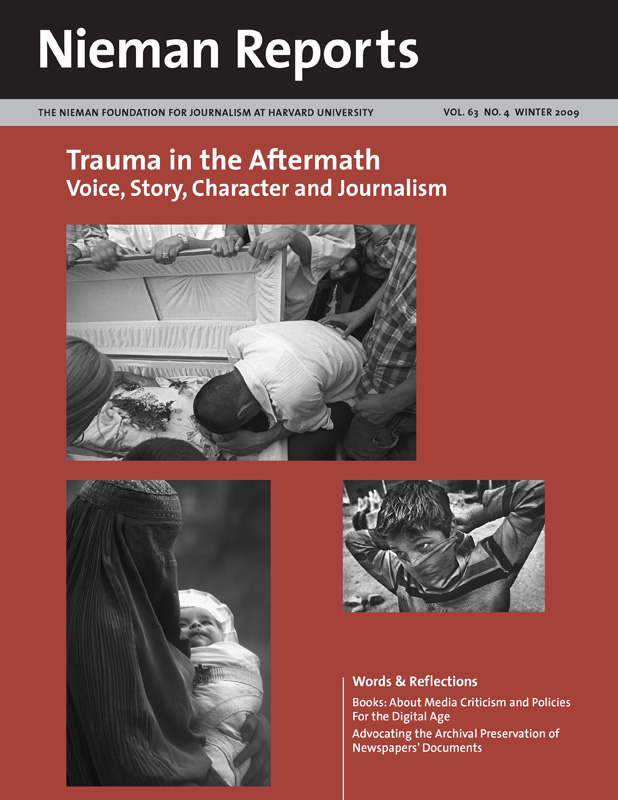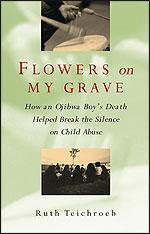Ruth Teichroeb was an investigative reporter at the Seattle Post-Intelligencer. In her 22 years as a reporter, she devoted much of her time to covering social issues involving vulnerable people. She described her work as being about “children, child abuse, a lot of intimate violence issues, domestic violence, institutional violence where for various reasons people, usually children or vulnerable people are put in an institution for their own safety and protection and then end up being violated or traumatized as a result of this experience. I’ve talked people into starting up beats that allowed me to do these stories.” She is the author of “Flowers on My Grave: How an Ojibwa Boy’s Death Helped Break the Silence on Child Abuse,” a story she worked on when she was with the Winnipeg Free Press.
I’d never really thought of what I’d done as “the trauma interview,” but when I look back over the kinds of things I’ve covered, it’s almost all I’ve done over the years. I’ve learned by doing, by making mistakes, by learning what works, and one thing that is primary is the issue of control.
It is just so different in an interview with a governor; everybody knows the rules and you play the game to hopefully extract information and find out what’s going on. It’s just a totally different landscape when dealing with someone who’s been traumatized. They don’t know the rules, and what’s so essential in these interviews is to give the person choices about a whole host of things—from logistics like where the interview is going to be done and who’s going to be there, all the way to what’s going to appear in print. Time is crucial. I think it’s insulting to a victim to go in and take their story and leave and put it in the newspaper without having that relationship—without them being able to say this is OK and this is not.
Teichroeb describes her experience investigating charges of child abuse at a residential school for the deaf. As she explained, “I had to take a long, long time to build trust. And not all of us have that time, but I did in this case. It took months in many cases for people to be willing to trust me enough and to know what my agenda was in order to share the secrets of what had happened at that school.”
It’s important, too, to learn the language of the community that you’re reporting on. With my story on the state-run school for the deaf, this was literally a cross-cultural experience for me. I was trying to understand their community and their language and dealing with a translator until I discovered instant messaging. This was wonderful; it was the best way to interview in the deaf community because it was the only way to communicate directly with the victim. Can you imagine trying to interview someone who was assaulted as a child through a translator? It just doesn’t work. And so instant messaging was a way to communicate directly even though it wasn’t verbal.
With a story she did about police abusing their own families and partners, Teichroeb learned another important lesson about her responsibility to protect the person who comes forward to tell a personal story involving trauma.
Sometimes it’s literally life and death issues that you are dealing with so it is important to give people the ability to say, “No, it’s not the right time,” or to control how they are identified in a story. They know what their level of risk is and need to make choices about that. But sometimes people don’t realize how dangerous the situation is for them.
Women were calling me to talk about their cop husbands, but there was one woman who called and she was in the middle of the most scary situation. Her response to it was almost suicidal. She wanted to tell the newspaper about it because she thought it would stop him, but it was absolutely the wrong place for her—she needed to be in hiding. She did not need to be in the newspaper.
So in that case a reporter has to make a choice. It was a big story. Some people might have gone for it. You have to weigh the situation and go, no, maybe five years from now, but not right now. Again, control and danger are issues that need to be thought about.

Karen Brown has been a public radio reporter for WFCR, the NPR affiliate in Amherst, Massachusetts for 11 years. In her work as a daily reporter, she has gravitated toward stories involving health and mental health, doing a few radio documentaries that have looked at refugees’ trauma and trauma related to mental health issues. She had recently done a shorter documentary on a soldier suffering post-traumatic stress disorder (PTSD) and his wife and the dissolution of their marriage. She focused on how best to approach stories about trauma when a reporter does not have the time necessary to form close bonds of trust.
How do you get at the trauma story in a respectful way? The choice I usually make is I give up the building of the relationship and I try to just let them know that I’m going to listen to them. I try to approach them in a way that they feel that they can trust me, and either they do or they don’t. But I’ve never chosen to save time by stopping them in the middle of their story. That’s the deal breaker. People need to start at the beginning of their story and go through it, telling whatever details are important to them. If you’ve got a five o’clock deadline and you’re thinking “I’ve got to get to the stuff I need to get to,” then the deadline is just going to have to be missed or do it the next day or whatever.
The most important thing is to let people tell the whole story so they know that you’re willing to listen to it. People get into sort of a trance sometimes, and it would be really harmful to break that up. What I might give up because I’m on a deadline is some of the details that I wanted. I’ll just have to get them later or I’ll have to do without. Those are sort of the choices that I find sometimes have to be made if I’m on a daily deadline.
Another choice I’ve made is I don’t pre-interview people. I do talk with a person long enough to know that this is someone I want to interview and get the basics of their story, but I always want them to be telling me their story for the first time when I have my tape recorder out and it’s on the record. To some degree that makes me unprepared, but I think it’s also helpful in a way. Part of it is just journalistic; you get the best material when it is for the first time, which is a little bit crass, but that’s part of what our concerns are. I also want them to feel like they’re telling me the story for the first time. I feel that is another way that I build trust when I don’t have a lot of time. They’re not telling me just as a vehicle, but they’re telling me because I don’t know the story yet and they want me to know it.
I want to make sure that people I am going to interview understand that they could go through a pretty emotional experience. I try not to talk them out of it, but I just want to make sure that there’s full disclosure about what they might go through. I learned that from a woman I interviewed who was tortured in El Salvador. She was a nun and, by now, an advocate, and she had told her trauma story a number of times. When I was setting up the interview, she told me she needed to have two days after the interview when she had nothing scheduled, when she could just sit alone in her house. She was willing to do that. This was part of her job and part of what she believed in; those were the conditions that she needed to live by based on her experience that every time she told her story, even if it was for the 50th time, she needed two days to recover from what it did to her. To me that was very instructive as to what my experience with them might have done.
Brown does her interviews for radio so she needs to use a microphone to record words for broadcast. Hear her talk about the microphone and how she helps people adjust to its presence:
I’ve found that people are put off by it [the microphone], so I spend the first five or 10 minutes talking about something completely different … it’s down here and we’re talking and then we’re just making eye contact, and by then it’s just face to face and they really don’t pay any attention to the microphone. I think it’s more jarring if you put the microphone on and off based on what they’re saying, and most of the time people just get used to it. And I feel it’s also honest. They know that it’s all on tape.

RELATED ARTICLE
Mike Walter discusses “Breaking News, Breaking Down” in the article “Tears Are Part of Telling the Story” from this issue.Mike Walter was for six years the morning anchor at WUSA in Washington, D.C. In this issue of Nieman Reports, he writes about reactions that journalists have had to his documentary film, “Breaking News, Breaking Down,” about emotional responses journalists have to covering stories involving trauma and violence. At the “Aftermath” conference he told what happened during an interview he did with the 16-year-old brother of an 18-year-old woman who’d been raped and murdered.
Walter describes how he and the young man did this interview on the day after his only sibling died. Here is an excerpt from the story he tells:
This kid—I’ll tell you. The first question I asked him, his lips started to quiver and I said, “Do you want to stop?” And just having that control—that we would turn the camera off—he said, “No. No. I’m going to get through this.” I’ll tell you what. I think it was one of the best stories that I ever did and I poured as much of my heart into that story as that kid did in front of me and the amazing thing to me was the story aired.
To learn more about journalists’ dilemmas in interviewing children who have been traumatized, listen as reporters and clinicians discuss issues of privacy, protection and the processes they use when talking with young children about sensitive and personal topic. Dr. Frank Ochberg, founder of the Dart Center, moderates the conversation.



